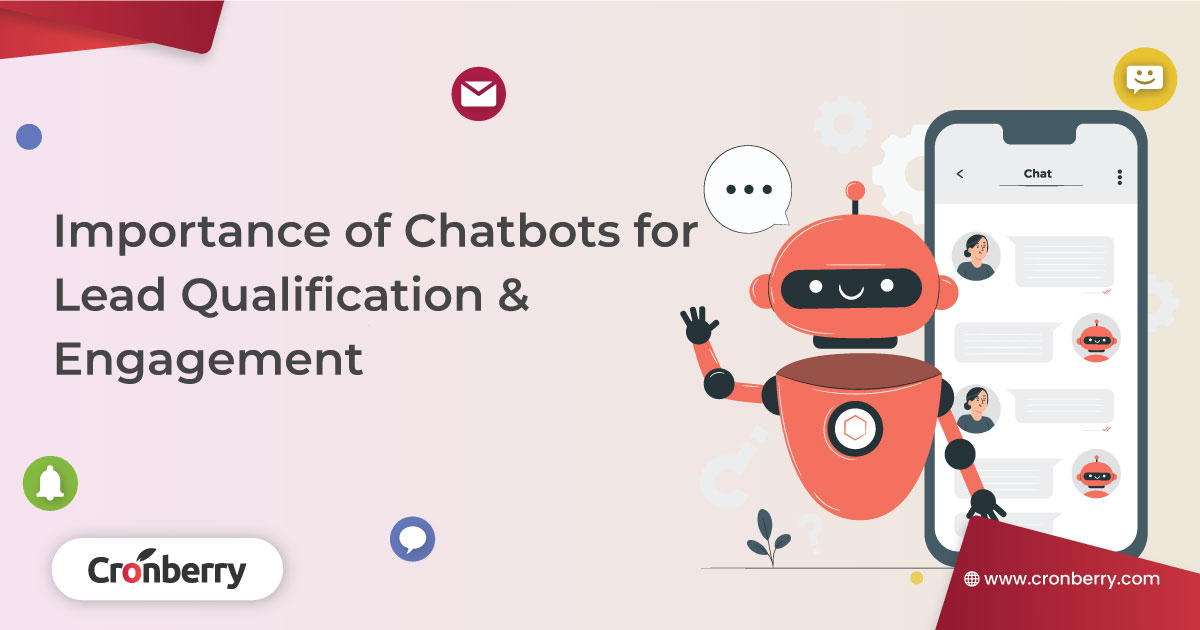Technology is getting at its peak and with the evolution of AI, new methods for better customer experiences are in the lane. As businesses continue to strive for improved customer experiences, chatbots have become a valuable tool for lead qualification and engagement in the CRM and marketing automation industry. In this article, we will understand the importance of chatbots in lead qualification and engagement and how they can benefit businesses of all sizes.
Today, chatbots have become an indispensable tool for lead qualification and engagement in the CRM and marketing automation industry. They can assist with collecting information, providing personalized recommendations, and engaging leads in meaningful conversations. They help provide instant responses, handle multiple conversations simultaneously, and free up time for sales teams. Also, these virtual assistants help businesses enhance their customer experience and increase the chances of conversion.
A chatbot is an artificial intelligence program designed to simulate human conversation. It can be integrated with various channels such as websites, messaging apps, and social media platforms to provide 24/7 customer support and sales assistance.
Types of Chatbots
Chatbots can be classified into two main categories:
-
Rule-based chatbots:
Rule-based chatbots are programmed to respond to specific questions or commands with predetermined answers. They use keywords and simple decision trees to guide the conversation.
-
AI-powered chatbots:
On the other hand, AI-powered chatbots use natural language processing (NLP) and machine learning algorithms to understand and interpret human language. They can learn and adapt to new situations, making them more flexible and intelligent.
-
Hybrid Chatbots:
These chatbots combine rule-based and AI-powered chatbots. They can respond to basic customer inquiries using pre-determined rules while using machine learning algorithms to improve their responses over time.
Utility of Chatbots in CRM and Marketing Automation
Chatbots have revolutionized the way businesses interact with their customers. They can assist with lead qualification by asking relevant questions, collecting information, and providing personalized recommendations. Not just this, but they can also engage leads in meaningful conversations, build rapport, and increase the chances of conversion. By automating repetitive tasks, chatbots can free up time for sales teams to focus on more complex tasks that require human intervention.
Virtual assistants can automate customer interactions and help companies save time and money while improving customer experience.
One of the key benefits of chatbots in CRM and marketing automation is their ability to provide instant responses. Customers expect quick and accurate responses to their queries, and chatbots can deliver just that. Moreover, businesses can provide 24/7 support and ensure that no leads slip through the cracks. They also handle multiple conversations simultaneously, allowing businesses to scale their operations without hiring additional staff.
Examples of Chatbots in Action
Several businesses have successfully implemented chatbots to enhance their lead qualification and engagement efforts. For instance, H&M’s chatbot on the messaging app Kik helped the company generate over 4 times more revenue than their average digital marketing campaign. The chatbot engaged users in a personalized conversation, asked for their style preferences, and recommended outfits based on their choices.
Another example is the chatbot used by Sephora on Facebook Messenger. The chatbot asked users questions about their skin type, preferred makeup style, and product preferences to recommend the best products for their needs. The chatbot also provided links to the Sephora website where users could make purchases.
It’s completely fair to say that chatbots or virtual assistants are like having a 24*7 available sales representative on your website, therefore seen as the future customer relationship managers.
Best Practices for Implementing Chatbots
Every business that plans to go online, will call for the requirement of a virtual assistant after some time as soon as it gets the desired reach, market coverage, and client base. That’s where it calls for the need for chatbots. But before implementing chatbots, keep the 4 crucial points in consideration.
-
Clearly Define the Purpose of the Chatbot:
Before implementing a chatbot, it is essential to define its purpose clearly. This will help ensure that the chatbot is programmed to provide the right type of responses to customer inquiries.
-
Provide Training Data:
If using an AI-powered chatbot, it is essential to provide it with enough training data. This will help it learn from past interactions with customers and improve its responses over time.
-
Ensure Consistent Branding:
Chatbots should be programmed to use the same tone and language as the brand. This will help ensure consistency in customer interactions.
-
Monitor Performance:
It is essential to monitor the performance of the chatbot regularly. This will help identify any areas that need improvement and ensure that the chatbot is meeting its objectives.
Significance of Chatbots in Better Customer Engagement & Interaction
Chatbots have become an increasingly important tool for businesses in the CRM (customer relationship management) and marketing automation industry, due to their increasing utility and functionality in different areas. Here are some key ways in which chatbots are significant:
24/7 availability
Virtual assistants can provide support to customers around the clock, even outside of normal business hours. This means that businesses can always be available to answer customer inquiries and provide assistance, leading to improved customer satisfaction.
Personalization
Personalization in every context proves to be impactful, and chatbots work well when it comes to customer interaction. It can be programmed to gather information about customers and their preferences, allowing for more personalized interactions. This can lead to better customer experiences and increased loyalty.
Efficiency
Another use case of these virtual assistants is the ability to handle multiple conversations at once and provide quick and accurate responses to customer inquiries. This can save businesses time and money, and can also lead to increased customer satisfaction.
Lead generation
The chatbots can be programmed to ask qualifying questions and gather contact information from potential customers, helping businesses to generate new leads and improve their sales process.
Data collection and analysis
The virtual assistants can gather valuable data on customer interactions, which can be used to improve marketing strategies and customer experiences over time.
Cost-effectiveness
Chatbots can reduce the cost of customer support by automating simple and routine tasks, such as answering frequently asked questions and freeing up customer service representatives to focus on more complex issues.
Scalability
Chatbots are highly scalable as they possess the ability to handle an unlimited number of conversations simultaneously, making them ideal for businesses with large customer bases. As a result, they can help businesses scale their customer support operations more easily and efficiently.
Consistency
Virtual assistants have a great potential to provide consistent responses to customer inquiries, ensuring that all customers receive the same level of service and reducing the risk of human error or bias.
SWITCH TO INDIA’S SMARTEST CRM-LMS SOFTWARE
If you’re looking for making your business operations automation-enabled with easy lead management and create high customer lifetime value (CLV), Cronberry is the tool for you.
Create campaigns, landing pages, web catalogues, track team performance and so much more. Unlock a more refined way of connecting with the target audiences via Emails, SMS, In-App messaging, and Push Notifications, thereby organizing a segmented strategy for imparting a tailored way of interaction. Segmenting users as per their behavioral activities, engaging them, nurturing, and retaining them thereafter was never this easy before. We believe in results and we’ve designed a complete package of CRM & Lead Management Services (LMS). It’s the time to make a difference.












